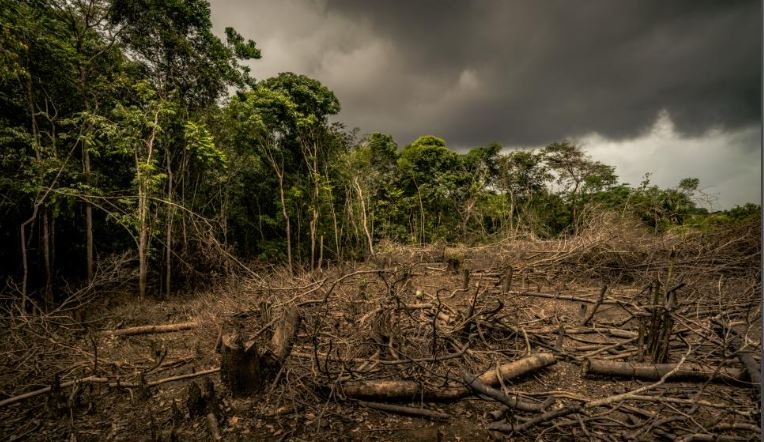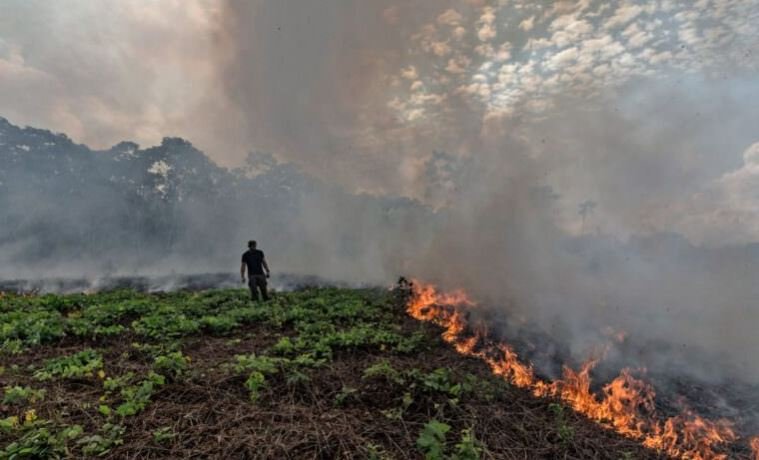How deforestation impacts global warming is a critical topic in understanding the environmental challenges facing our planet. Forests play a key role in absorbing carbon dioxide (CO2) from the atmosphere, acting as natural carbon sinks. However, when trees are cut down or burned, this carbon is released back into the atmosphere, contributing significantly to global warming. In this post, we will explore the link between deforestation and global warming, focusing on how deforestation accelerates climate change, disrupts ecosystems, and impacts biodiversity.

1. The Role of Forests in Carbon Absorption
Forests are crucial in the fight against global warming because they absorb vast amounts of carbon dioxide. Trees capture CO2 during photosynthesis and store it in their trunks, leaves, and roots. This process helps regulate the Earth’s climate by reducing the concentration of CO2, a major greenhouse gas.
How deforestation impacts global warming becomes clear when we consider what happens when trees are removed. Without forests to absorb carbon, the atmosphere retains higher levels of CO2, leading to a stronger greenhouse effect. This results in more heat being trapped in the atmosphere, which drives up global temperatures.
2. Increased Carbon Emissions from Deforestation
Deforestation doesn’t just stop carbon absorption; it actively increases carbon emissions. When forests are cleared, particularly through burning, the carbon stored in trees is released back into the atmosphere. This release further amplifies the greenhouse effect and accelerates global warming.
In tropical regions, such as the Amazon rainforest, deforestation is especially detrimental. The Amazon alone stores billions of tons of carbon, and its destruction could significantly increase global carbon levels. How deforestation impacts global warming is evident in the spike in CO2 emissions associated with forest fires and large-scale tree removal for agriculture and urban development.
3. Disruption of the Water Cycle and Local Climates
Beyond carbon storage, forests play a vital role in regulating local climates and the global water cycle. Trees release water vapor into the atmosphere through a process called transpiration, which contributes to cloud formation and precipitation. When deforestation occurs, this natural water cycle is disrupted, leading to reduced rainfall and drier climates in the affected regions.
How deforestation impacts global warming also relates to changes in land surface temperatures. Forests help keep the Earth cool by reflecting sunlight and maintaining moisture levels. Without trees, exposed land absorbs more heat, further increasing local temperatures and contributing to the overall warming of the planet.
4. Loss of Biodiversity and Ecosystem Services
Forests are home to an incredible diversity of plant and animal species. Deforestation leads to habitat destruction, putting many species at risk of extinction. The loss of biodiversity also reduces the resilience of ecosystems to climate change and other environmental stressors.
How deforestation impacts global warming becomes even more critical when considering the loss of ecosystem services. Healthy forests provide essential services like flood control, soil stabilization, and water purification. As deforestation continues, these services are diminished, making communities more vulnerable to the impacts of climate change.
5. Deforestation’s Role in Positive Feedback Loops
One of the most dangerous aspects of deforestation is its ability to trigger positive feedback loops that exacerbate global warming. As deforestation increases temperatures and dries out forests, the risk of wildfires grows. These fires release even more carbon into the atmosphere, leading to further warming.
Additionally, higher global temperatures contribute to the thawing of permafrost in Arctic regions, releasing trapped greenhouse gases like methane. How deforestation impacts global warming extends beyond the immediate release of CO2, as these feedback loops accelerate climate change at a faster rate than previously anticipated.
Conclusion
In conclusion, how deforestation impacts global warming is a matter of global concern, as the loss of forests directly contributes to rising carbon emissions, disrupted water cycles, and the destruction of biodiversity. Deforestation removes one of our planet’s most effective tools for mitigating climate change—trees. Without urgent efforts to protect and restore forests, global warming will continue to accelerate, posing severe threats to ecosystems, human health, and global economies. The preservation of forests is essential for maintaining the Earth’s climate balance and ensuring a sustainable future for all.

